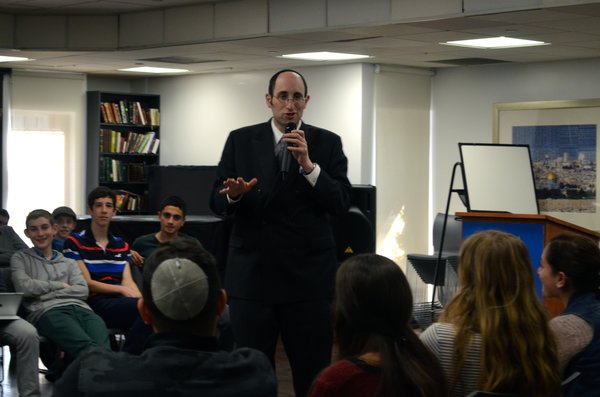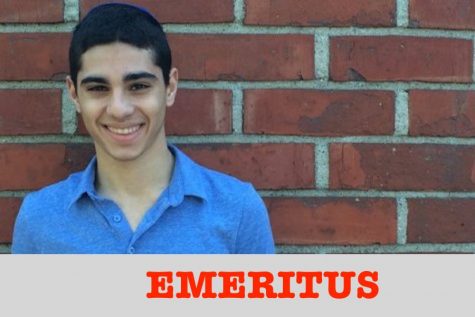Rabbi Meir Soloveitchik emphasizes Begin’s legacy of nationalism in Beit Midrash talk

INSPIRING: Rabbi Meir Soloveitchik engaged students with smiles Dec. 12.
January 13, 2014
Rabbi Meir Soloveitchik, one of today’s most prominent American Modern Orthodox rabbis, came to Shalhevet last month with the objective not of talking about his own life, but of Menachem Begin’s.
In a speech during Town Hall Dec. 12, Rabbi Soloveitchik said Jewish unity and nationalism are among the most vital parts of Judaism — as demonstrated by the life of former Prime Minister Begin, who is being honored by Yeshiva University to celebrate his 100th birthday year.
“For all of his achievements, for him the biggest thing was unity,” said Rabbi Soloveitchik, whose great-uncle was Rav Yosef Soloveitchik, the founder of Modern Orthodoxy. “If there is no unity, there will no state and no country.”
Rabbi Soloveitchik leads the Strauss Center, a group within Yeshiva University, whose faculty members are traveling around the country to discuss the life of Prime Minister Begin, who died in 1992. YU is also offering a courses this year analyzing his life and impact.
Originally from Belarus, Begin led the Irgun, a Jewish paramilitary force, during the 1930s and 40s, then was elected to the Knesset after the establishment of Israel. He served as Israel’s prime minister from 1977 to 1983. During his term, he made peace with Egypt, struck the Iraqi nuclear reactor and led Israel during the Lebanon War.
But his decisions were more notable than his actions, the rabbi said.
“When we look at history, we tend to focus on what great men did do, not what they did not do,” Rabbi Soloveitchik said. “But if you look at Menachem Begin — and even George Washington — most of their greatness came at what they did not do.”
During the Altalena Affair of June 1948, Begin prevented a civil war — by deciding not to fire back at the IDF after his own ship had been attacked.
It was one month after the establishment of the state that May. and Israel needed to combine all of the different Jewish military organizations that had fought in its war for independence into one group, the Israel Defense Force.
The Irgun ship Altalena was supposed to have arrived in Israel in early May with fighters and weapons. But it arrived late, after the state had been declared. By this time, Begin as Irgun leader had already agreed for his group to be absorbed into the IDF, and part of that agreement meant that they surrender all weapons to the IDF.
When the Altalena arrived from France, Begin was ordered to immediately surrender all of its weapons. The ship was carrying nearly 1.000 Jews and 153 million francs’ worth of military equipment, according to Wikipedia.
But he failed to respond to the ultimatum in time, so the IDF fired at the Altalena, killing 16 Irgun members. Begin did not fire back and a ceasefire prevented further deaths.
Despite the profound message Rabbi Soloveitchik attempted to convey, his method of speaking was rather more humorous and relatable. He referenced television shows like The Simpsons multiple times, and he even asked to be referred to by his nickname.
“I thought Rabbi Soloveitchik’s presentation was singular in his ability to weave Jewish history, pop culture and Torah seamlessly into an eloquent and engaging talk,” said Judaic Studies teacher Rabbi Ari Schwarzberg said. “A Jewish leader with such a breath of knowledge and a synthesis of interests is a very important model for our school.”
To describe Jewish unity in the present day, Rabbi Soloveitchik shared a personal anecdote of a time he met and danced with a Jewish stranger dressed as a Hobbit character in Central Park. His point was that no Jew was a stranger to another Jew, regardless of his country or religious affiliation.
A larger example, he said, is how Sephardim and Ashkenazim have integrated harmoniously the past few generations even though they were separate for many centuries and had developed distinct traditions.
Comparing the two groups to twins, he explained that In the Torah, there are only two sets of twins mentioned: Yaakov and Esav, and then Peretz and Zerach, the grandsons of Yaakov. Rabbi Soloveitchik noticed that Yaakov and Esav are called tamim – twins with one aleph – but Peretz and Zerach are ta’amim, with two alephs.
In both cases, he said, the brothers’ relationships were very strong. But Peretz and Zerach were extremely close, while Yaakov and Esav became mortal enemies.
“We as Jews are not all twins, but we are, halachically and philosophically, ta’amim with two alephs,” Rabbi Soloveitchik said. “We synchronize with one heart. We are covenantally linked since the days of Sinai.”
Rabbi Meir Soloveichik comes from the long, respected Brisker dynasty of rabbis, which includes his grandfather, Rabbi Aaron Soloveitchik, in addition to his great uncle. He studied at Yeshiva University and Yale and then received a Ph.D. in religion at Princeton University.
Junior Tom Amzalag thought that his speech was successful because he was both funny and inspiring.
“I think that he was definitely a great speaker,” Tom said.”He was funny, interactive and knowledgeable and I was interested and focused at what he had to say the whole time just because of his bloodline and who he was related to. And addition to that he said some things that were very inspiring so I really enjoyed what he had to say.”
Sophomore Shirin Nateneli agreed that unity is an essential proponent to Judaism.
“I 100 percent agree with everything that he said,” Shirin said. “I think that for Judaism to continue to survive we need unity and to be together and that will keep us going forever.”













